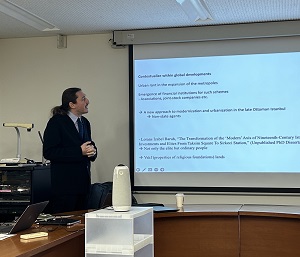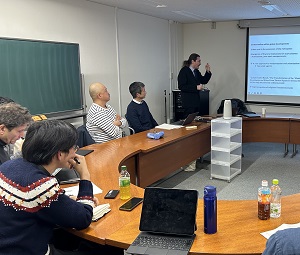Report
On January 29, 2024, the Tobuken Seminar, "Role of Armenian Construction Companies in the Capitalist Urbanization of the Late Ottoman Istanbul" was held at the Institute for Advanced Studies on Asia. Professor Yaşar Tolga Cora of Boğaziçi University, who specializes in the social and economic history and labor history of the late Ottoman Empire, gave a lecture on the role of Armenian urban development companies in the suburban development of Istanbul during the late Ottoman period. Through a detailed examination of the activities of two Armenian urban development companies and their shareholders in the 1880s and late 1910s, Professor Cora discussed the involvement of Armenian entrepreneurs, the state, and private investors in the transformation of Istanbul's suburbs into residential areas.
The seminar attracted 11 in-person and 16 online participants, and during the Q&A session, questions were asked and discussed from a variety of perspectives.
Event Details:
Date and time: January 29, 2024 (Mon), 3:30pm~5:00pm
Venue: Institute for Advanced Studies on Asia, 2nd Meeting Room (302)/Zoom
Speaker: Yaşar Tolga Cora (Boğaziçi University)
Title: Role of Armenian Construction Companies in the Capitalist Urbanization of the Late Ottoman Istanbul
Chair: Jun Akiba (IASA, U Tokyo)
Lecture Abstract:
This lecture will focus on the histories of two Istanbul-based urban development companies, namely Arevelyan Tntesakan Miutiwn/ Cemiyet-i Tasarrufiyye-i Şarkiyye (Oriental Savings Company), a company established by the upper-class Armenian entrepreneurs in 1886 and the Incirli Estate Construction Joint-Stock Company by the former parliamentarian, Stephan Spartalian in 1917. The main purpose of these companies was similar to many of their counterparts in the metropolitan centers around the world at the time; they aimed to create urban rant by transforming suburban areas, particularly vakıf lands outside the walls of Istanbul, into residential lands and sell them to middle and upper-middle class entrepreneurs. By examining the documents both from the Ottoman Archives and the Armenian press, the lecture will first examine the process through which the companies appropriated these lands and the ways in which they opened up the vakıf lands for construction. Second, the lecture will discuss the profiles of the founders and the shareholders of the companies. The profiles of the shareholders which include Istabulites of all ethno-religious communities and from different social groups will show the diversity of people who invested in these companies to have a share in urban rant. Last but not least, the lecture will analyze various levels of relations between the Armenian entrepreneurs and the state authorities, and discuss to what extent the tense relations between the Armenian community and the authorities affected the activities of these companies. Thus, the presentation will highlight that the transformation of suburban land into residential lands was essential for the expansion of the city outside walls of the intramural Istanbul, hence the construction companies played a central role in the urban history of the late Ottoman capital.
*This seminar was supported by JSPS Kakenhi Grant number 20KK0266 (principal investigator: Masayuki Ueno).


